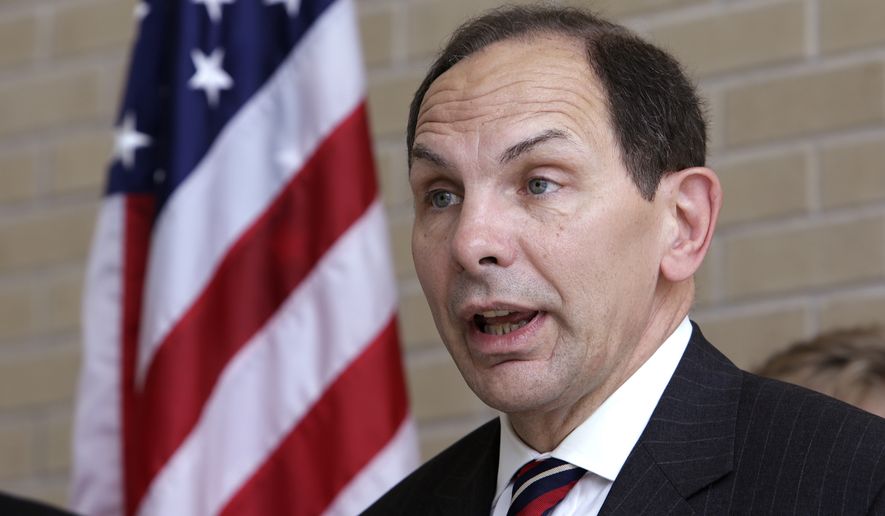The new law to fix the VA is barely three months old and the cracks are already showing as Congress and new department Secretary Bob McDonald clashed over the law’s first big deadline to get veterans into private medical care.
Veterans groups also say Mr. McDonald is moving too slowly to fire bad employees.
Mr. McDonald fired back at Congress and other critics who accused him of missing a 90-day deadline for issuing Choice Cards to veterans, saying he didn’t read the law as a requirement.
“The law didn’t specify specifically which cards would go out on which day,” he told reporters on Thursday. “Laws generally are not that clear.”
The bill says that “the secretary shall, not later than 90 days after the date of the enactment of this act, issue to each veteran described in subsection (b)(1) a card that may be presented to a health care provider to facilitate the receipt of care or services under this section.”
And, as for his firing powers, the secretary said the law doesn’t go as far as some of his critics claim it does.
Rep. Michael Michaud, ranking member of the House Veterans Affairs Committee and a key author of the bill, said his expectation was the secretary would abide by the timeline laid out in the law for issuing the new choice cards.
“The intent of the law was that the choice cards would go out within 90 days,” said Dan Rafter, a spokesman for the Maine Democrat. “The congressman expects VA to implement all provisions of the legislation on the timelines laid out within the law — and that they maintain an open and transparent dialogue with Congress should they encounter any difficulties in doing so.”
The cards were a key part of the law a bipartisan Congress rushed to pass and President Obama signed to great fanfare in August, hoping to reform the VA after reports of veterans dying while waiting for care and of a culture that put the VA bureaucracy ahead of veterans’ needs.
Under the new program, veterans who live far from a VA facility or who have been stuck on a waiting list for care could use their card to get treatment at a private clinic.
The 90-day deadline for mailing the cards fell on Nov. 5. On that day, Mr. McDonald said in a blog post his department was beginning to send out a first phase of cards, with a second phase to follow shortly. The third phases of cards will be sent in December and January.
He said congressional staffers and veterans service organizations “pleaded” with the VA to send the cards in stages to avoid chaos that could result if 9 million veterans received their cards at once without understanding when and how to use them.
But Dan Caldwell, legislative director of Concerned Veterans for America, said there is no “wiggle room” in the bill’s deadline. He also said the department’s decision to put the cards for veterans who have been stuck waiting for care until a later phase is questionable.
“The vets who needed it the most were the ones on the wait list,” he said. “It seemed odd to us that they weren’t the first group to receive it.
Mr. McDonald said he’s made substantial progress since taking over as secretary in late July, after his predecessor was fired in the wake of the botched care scandal.
“If you look at what we’ve accomplished from the time the law was passed to the day, yesterday, when the cards started going out, I think you would argue it is nothing short of excellent execution,” said the new secretary, who took over in late July, a week before Mr. Obama signed the VA clean-up bill into law.
Veterans groups say the secretary should be taking advantage of part of the new law that gives him the power to more easily fire top-level staff members.
But Mr. McDonald said the law, even with the new changes, constrains him.
“Let’s look at the new ’power’ I was granted,” he said. “The new power I was granted is the appeal time for senior executive service employees of the VA has been reduced in half, that’s the only change in the law. Senior executive service are less than 1 percent of VA employees, and the only change is the appeal time.”
Some critics have accused the VA of allowing employees to retire before they can be fired, meaning they collect their retirement benefits.
Mr. McDonald, however, said he is unable to take away someone’s earned retirement unless they committed treason — and he believes lawmakers know that, yet still attack him.
“These laws are very clear and I’m skeptical whether members of Congress don’t understand the law,” he said. “What discourages me is we’re trying to create controversy using veterans to do that and I don’t think that’s appropriate.”
Mr. Caldwell, though, said allowing fireable employees to retire is a sign that Mr. McDonald and his department still don’t want to hold employees accountable.
“Based on his background and the broad support he received across Congress, we really thought a lot of things would change at the top level,” he said. “Really nothing has changed since he took over in terms of the VA culture, and we’re very disappointed in that.”
• Jacqueline Klimas can be reached at jklimas@washingtontimes.com.




Please read our comment policy before commenting.